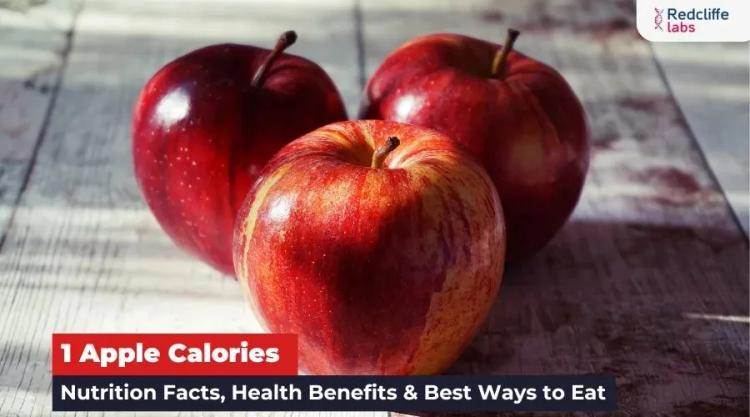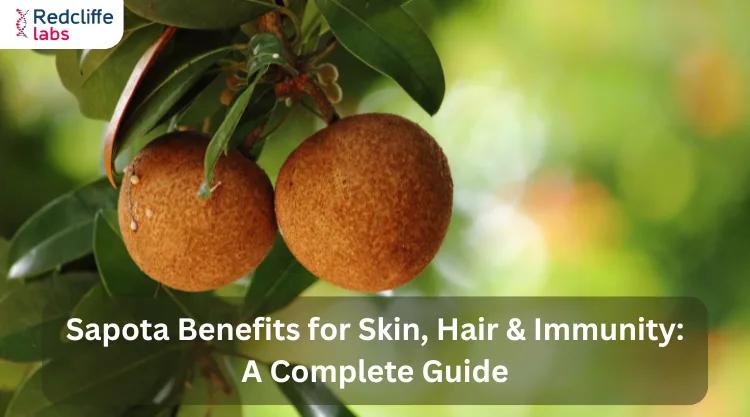Chiku Fruit: Benefits, Nutritional Value, and More!

Medically Reviewed By
Prof. Ashok Rattan
Written By Sheena Mehta
on Oct 3, 2024
Last Edit Made By Sheena Mehta
on Jul 19, 2025

Chikoo is a tropical fruit rich in vitamins and minerals promoting well-being. Eat it as a snack or mix it into smoothies and desserts to treat your taste buds.
Chiku or sapota’s outer appearance is fleshy brown, but its inside tastes grainy. Unlike apples, bananas, and oranges, the fruit may not be everyone’s first choice, but it is a powerhouse of nutrition. Regular consumption can help you overcome many diseases and keep your body healthy.
Read on to learn more about chikoo, including its nutritional value, health benefits, how to use it, and downsides.
5 Interesting Unknown Facts about Chiku
The interesting facts about chiku are:
- Sapodilla (Manilkara Zapota) belongs to Mexico, Central America, and the Caribbean.
- Unlike in other parts of the world, such as the Philippines, India, South Africa, South Australia, and South America, chinos are unfairly common in the United States.
- Other names for the fruits are Dilly, Naseberry, Chicle, Chicozapote, and Zapote.
- Sapota (Chiku) is high in calories. A 100 g of Chikoo can offer you 83 calories. Besides, it is a rich source of dietary fiber. The fruit's pulp contains laxatives packed with vitamins A, C, niacin, and folate.
- The skin and leaves of the fruit contain antidiarrheal, diuretic, antibiotic, and ant-hyperglycemic effects that help treat colds and coughs.
Nutritional Value of 100 g Chikoo/Sapota
A 100 g serving of chiku has 83 calories and many more essential nutrients, making it a superhero in the world of fruits.
| Nutrient | Amount 100 g |
| Energy | 94 kcal |
| Carbohydrates | 20 g |
| Fiber | 5.3 g |
| Protein | 0.4 g |
| Fat | 1.1 g |
| Phosphorus | 12 mg |
| Sodium | 12 mg |
| Vitamin C | 14.7 mg |
| Potassium | 193 mg |
| Calcium | 210 mg |
| Iron | 0.8 mg |
| Magnesium | 12 mg |
Top 12 Reasons that Make Chiku a Beneficial Fruit Health
Let’s explore the health benefits of chiku, making it a superfruit that promotes your overall well-being.
- Promotes gut health: Chikoo's antiviral, antibacterial, and anti-inflammatory properties treat stomach-related problems such as gastritis, irritable bowel syndrome, and constipation. The fruit's high fiber content promotes the growth of good bacteria, making your digestive system healthy.
- Strengthen bones: Chikoo is an excellent source of copper, iron, phosphorus, and calcium. Hence, eating Chikoo daily can help improve bone quality. Copper deficiency in your diet may lead to osteoporosis. However, eating the fruit can strengthen your bones, muscles, and tissue strength.
- Bolsters Immunity: If your immune system is weak, and you are looking for healthy ways to strengthen it, invest in chikoo fruit. It contains vitamins C and A and antioxidants known to boost immunity, which are crucial to fighting viruses and bacteria. In addition, it can promote skin health and lower the risk of chronic diseases.
- Enhances skin health and beauty: Chikoo can do wonders for your skin. The fruit is a rich source of vitamin C, which helps promote collagen production and skin elasticity. Polyphenols, flavonoids, and antioxidants also reduce signs of aging.
- Prevents Cancer: Phytochemicals are natural suppressants that curb the action of carcinogens on specific tissues and thus minimize the risk of disease. Besides, fruit is also believed to be a traditional medicine that does not let cancerous cells grow because of antioxidants like phenolics and carotenoids.
- Hemostatic Properties: This material or substance can prevent blood loss. Hence, it is applied to wounds related to bleeding in cases of piles and injuries.
- Relieves cold and cough symptoms: Chikoo helps relieve cold and cough symptoms. The fruit's chemical compounds remove phlegm and thick mucus from the respiratory tract. Its consumption can also help keep congestion and coughs at bay.
- Anti-depression properties: Chikoo is a sedative and thus helps calm the nerves and relieve stress. If you suffer from insomnia, anxiety, or depression, eat the fruit to feel better.
- It is good for the eyes: Chikoo is rich in vitamins and minerals. Vitamin A in Chikoo keeps the eyes healthy and improves visual cell formation. Eating fruit daily doesn’t deteriorate your eyesight for long, and you see clearly even in old age.
- Aids in weight management: Chikoo is high in fiber and water content. You will feel full after eating chikoo, and thus happy and satisfied for not getting hunger pangs that make you indulge in unhealthy eating.
- It is good for the liver: Chikoo Sapota is also good for the liver. It eliminates toxins and supports liver function, contributing to overall liver health.
- Good for pregnant moms: Morning sickness and dizziness are common symptoms for pregnant women. However, Chikoo can help them tackle these problems and feel better. Besides, the fruit is high in calories and energy, making it good for breastfeeding moms.
List of best fruits good for pregnant women
Below listed are the five best fruits to include in the diet of pregnant women:
- Apricots are an excellent source of calcium, vitamins, and phosphorus, keeping them healthy during pregnancy.
- Oranges: Citrus fruits like oranges contain high water content and promote health and overall well-being.
- Mangoes contain several nutrients, such as vitamin C, A, iron, and manganese, making them a beneficial snack for moms-to-be. Its intake helps satisfy their pregnancy cravings and hunger.
- Avocados: Half an avocado can offer 485 mg of potassium to pregnant women, making it a superfruit for them.
- Bananas: Expecting moms to eat bananas throughout their pregnancy. Not only does it help ladies who suffer from anemia by raising their hemoglobin levels, but being rich in carbohydrates can give them much-needed energy.
Want to buy Chikoo? You Must Know How to Select and Store the Fruit.
Checking ripeness and storage conditions when selecting and storing a chikoo is vital. This ensures their freshness is well-maintained.
You can select Chikoo by:
- Looking at its ripeness. It should be smooth, brown skin.
- Press the fruit to check if it yields slightly, not too soft or mushy.
- Avoid cracked or bruised chikoo. They might be overripe or damaged.
- Ripe chikoo is sweet and has a pleasant aroma. A chick with a fermented smell might be overripe.
How to Store Chikoo?
Three steps involving how you can store chikoo:
- You can store an unripe chikoo at room temperature for 2-3 days. This allows chikoo to ripen naturally.
- Once ripe, store the fruit in the fridge to slow the ripening process, lasting 4-5 days.
- Keep chikoo in a cool and dry place to avoid excess moisture.
Five side effects of eating chikoo
After knowing about the health benefits of chikoo, it’s time to explore its side effects.
The best thing about Chikoo (Sapodilla) is it has a low number of adverse effects. However, excessive consumption of the fruit can cause:
- Intestinal Difficulties: Overconsumption of chikoo can lead to intestinal discomfort, such as gas, diarrhea, and sometimes even intestinal blockage, which can cause cramping.
- Problematic for diabetics: The high glycemic index (GI) in chikoo can cause a rapid spike in blood sugar levels in people with diabetes.
- Inflammation and irritation: If consumed in excess, it can cause inflammation and irritation, which can result in breathing problems.
- Stomach ache and vomiting: Chikoo seeds can cause stomach aches and vomiting. So, one should avoid overconsumption.
- Throat itchiness: The chikoo's tannins and latex can cause allergic reactions, which may lead to itchiness or swelling in the throat.
3 Unique Ways to Serve Chiku (Sapota)
You can serve sapota in the following ways:
- Consume it fresh: First, wash the chikoo in running cold water. It is ready to eat. You can also cut it into two halves, scoop the flesh, discard the seeds, and add salt to taste before consuming it.
- Add-on-to fruit salads: Add fresh chikoo to fruit salads to enhance the taste.
- Make a smoothie: A sapota smoothie is a nutritious beverage.
How do you make a chikoo smoothie?
Steps involving making a chiku smoothie are:
- Peel the fruit, remove its seeds, and cut it into small pieces.
- Blend pieces with chilled milk, honey, or sugar until smooth.
- Pour into a glass. Add some ice cubes. Read to serve.
Final Views on Chiku Benefits
Chikoo, or sapodilla, is a nutritious fruit that should be noticed. To obtain maximum benefits, you can incorporate chikoo into your daily diet through chiku milkshakes, halwa, smoothies, jams, jellies, cakes, and other desserts. However, moderation is key to avoiding side effects.
Frequently Asked Question: Chiku Benefits
1. Can I eat chiku daily?
Yes. You can eat 1-2 chikoo per day to avoid a high sugar and calorie intake.
2. What is the best time to eat chiku?
Lunch or supper is the best time to eat chiku to obtain maximum benefits. They contain dietary fiber that helps moderate blood sugar levels.
3. Can I eat chikoo on an empty stomach?
Yes. Eating chikoo on an empty stomach (before breakfast or even before a workout) is safe. The fruit can help boost energy and enhance workout output.
4. What is Chiku famous for?
Chikoo is famous as a nutritional powerhouse, rich in vitamins and minerals and dietary fiber. Consuming it can help improve digestion, enhance immune function, and promote healthier skin.
5. Where can you find Chiku in India?
Sapota (chikoo) is widely cultivated in Maharashtra, Gujarat, Karnataka, Tamil Nadu, Andhra Pradesh, and Telangana. It is readily available during its peak season from September to December.



